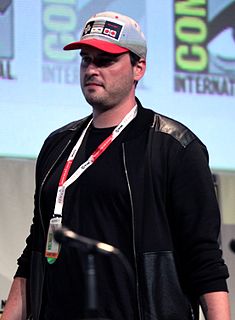A Quote by Paul Craig Roberts
Marxism is a success because it fuses the two inconsistent strains in Western thought - moral skepticism and moral indignation - and makes them complements in the attack against existing society.
Related Quotes
Since I hold no judgments against my characters, no matter how heinous they might seem, I present them as real people with their own moral centers. We might feel those moral centers are mis-calibrated, but they are there and are the rudders that propel them. This makes reading my work a visceral roller coaster, 'cause the reader must embark on the journey of the protagonist equipped only with his or her own moral center.
Moral Injury is differentiated from PTSD in that it directly relates to guilt and shame veterans experience as a result of committing actions that go against their moral codes. Therapists who study and treat moral injury have found that no amount of medication can relieve the pain of trying to live with these moral burdens.
Civil society rests on moral relationships. They are covenantal rather than contractual. They are brought about not by governments but by us a husbands and wives, parents, friends and citizens, and by the knowledge of what we do and what we are makes a difference to those around us. (...) Renewing society's resources of moral energy is the program, urgent but achievable.
This is another thing which I really like investigating in my novels: what is it that makes an intimate society, that makes a society in which moral concern for others will be possible? Part of that I think are manners and ritual. We tried to get rid of manners, we tried to abolish manners in the '60s. Manners were very, very old-fashioned and un-cool. And of course we didn't realise that manners are the building blocks of proper moral relationships between people.
In later years, when I started working in police ethics, I was professionally drawn back to the topic but as well was better able to see two sides to loyalty - its importance for certain central human relations such as friendships, but also its corruptibility in the sense that loyalty could be invoked against other moral constraints: it sometimes function as something of a moral Trojan horse, undermining other moral considerations.
There ought not be two histories, one of political and moral action and one of political and moral theorizing, because there were not two pasts, one populated only by actions, the other only by theories. Every action is the bearer and expression of more or less theory-laden beliefs and concepts; every piece of theorizing and every expression of belief is a politcal and moral action.
When you say there's too much evil in this world you assume there's good. When you assume there's good, you assume there's such a thing as a moral law on the basis of which to differentiate between good and evil. But if you assume a moral law, you must posit a moral Law Giver, but that's Who you're trying to disprove and not prove. Because if there's no moral Law Giver, there's no moral law. If there's no moral law, there's no good. If there's no good, there's no evil. What is your question?





































